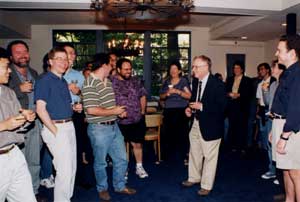|
HOME | SEARCH | ARCHIVE |
|
After the Nobel
Laureates on campus recall the shock of instant fame
![]()
By Diane Ainsworth, Public Affairs
| |  George Akerlof, who shares the 2001 Nobel Prize for economics, got lots of attention at a departmental tea last week honoring him as the newest Berkeley Nobelist. Peg Skorpinski photo |
17 October 2001
|
Get an extra secretary and start taking liver tonic is the advice that last year’s Nobel laureate in economics, Professor Daniel McFadden, offered colleague George Akerlof, the campus’s newest winner. As past prize winners attest, becoming a Nobel laureate is a startling experience, a lesson learned quickly by Akerlof, a macroeconomist in the College of Letters and Science who was honored this year for his work on the role of asymmetric market information. In the week since the announcement, Akerlof has been fielding press queries, doing interviews, meeting dignitaries, attending receptions, and leading the Cal Band at last Saturday’s football game. Clearly, life will never be the same for Berkeley’s 18th Nobel laureate. Those who have come before him know what it’s like. “Winning it gives you additional responsibilities, particularly to the public,”said Charles Townes, the Berkeley physicist who won the prize in 1964 for the invention of the maser, a device for studying the spectra of microwaves. “When you get a Nobel Prize, people expect you to have a lot of wisdom, more than you do, and they want you to comment on everything,” said the retired physicist, who still works in Berkeley’s Samuel L. Silver Space Sciences Laboratory. When economist Daniel McFadden heard last Wednesday morning that his colleague had won the Nobel Prize, he went right over to Akerlof’s house — where the press was already converging — “to begin to forewarn George about what he was in for,” he said. Preparing for the December Nobel ceremony in Stockholm, Sweden usually keeps recipients occupied right up to the time of the event. Prize winners are expected to give five lectures there — besides being invited to full gown-and-tuxedo dinners and banquets, the most formal events imaginable. “I told him he should start taking his liver tonic right now,” McFadden joked, “because it’s a high-intensity event.” Winning a Nobel Prize has turned some scholars’ lives around in other ways, as well. Lithuanian-born poet and man of letters Czeslaw Milosz, whose work denounced Hitler and the spread of communism, was censored in Poland and emigrated to the United States to continue his writing among the literary underground. For 20 years, the Polish-language poet wrote in obscurity while teaching Slavic literature at Berkeley. Another Berkeley laureate, after winning the Nobel Prize, decided to devote the rest of his career to advancing science and education in his native Taiwan. Lee won the Nobel for his pioneering work on the dynamics of chemical reactions.
He recalled the avalanche of invitations — to dinners, lectures, fundraisers, U.S. governmental affairs and a variety of other public functions — and the snowstorm of requests to write opinion pieces. The New York Times, the Washington Post, the Los Angeles Times and news magazines were all on the horn to solicit his editorials.
Milosz had served the Polish government as a diplomat in the 1940s, but it was not until 1980 — after the Nobel committee awarded him the prize for literature and the world press began to publish his poems — that his home government finally recognized his body of literature.
Yuan Lee, who won the 1986 Nobel Prize for chemistry, became president of Academia Sinica, Taiwan, the highest national academic institution in the Republic of China; he continues to hold that position today.
Home | Search | Archive | About | Contact | More News
Copyright 2000, The Regents of the University of California.
Produced and maintained by the Office of Public Affairs at UC Berkeley.
Comments? E-mail berkeleyan@pa.urel.berkeley.edu.